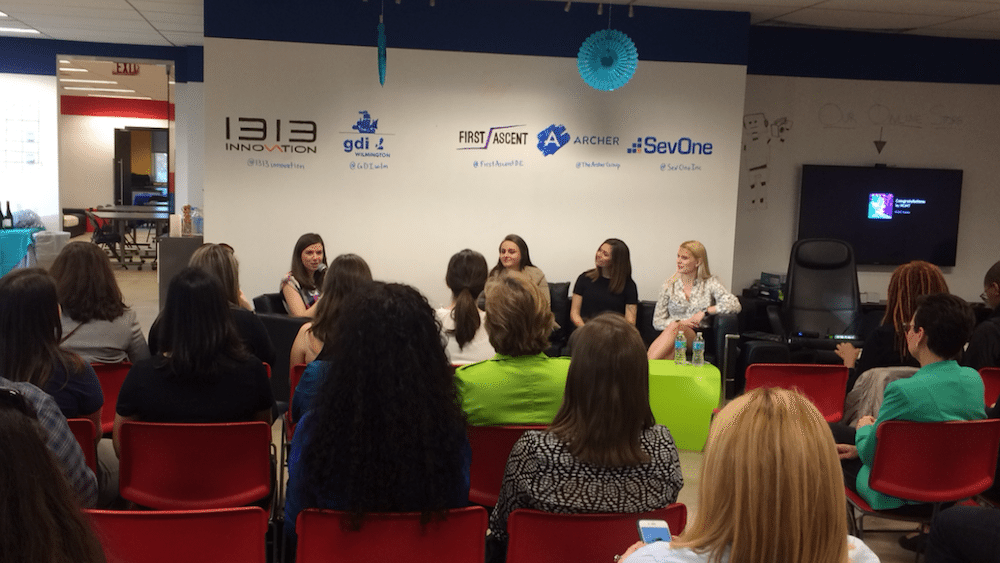When you agree to do a group interview, you never know what you’re going to get. Sometimes one person will dominate the conversation, and sometimes the group doesn’t gel and things get awkward. Sometimes you’re stuck with a bunch of head-nods and one-word answers.
But last night at Girl Develop It’s Successful Women in Tech panel, Pauline Rubin, Jessica Scarane and Tanya Bakalov made my job as moderator a cakewalk. They totally rocked it and had a bunch of compelling insights and advice to women about succeeding in the tech field.
As one audience member, Sadhana Pasricha, aptly put it, they capitalized on the three C’s, and I’ll add another with curiosity. Here’s what she means.
1. Communication
“Projects live or die by communication,” said Scarane, who’s a business analyst at The Archer Group. Good communication, she said, often means good listening, sometimes learning a little empathy, spending fully-focused time with people and not being afraid to ask questions. Pauline Rubin, a web developer and cofounder of First Ascent Design, said it’s often useful to keep up with coding languages and new developments in the field to better understand what clients want and to also be on the same wavelength as other developers.
2. Connections
The women talked at length about the importance of community and networking. Rubin said there’s been a lot of talk lately about how to attract tech talent to Delaware, and she wishes more people would focus on the talent that’s already here.
A lot of people might have interests and strengths in technology, but perhaps work a different 9-to-5 job and aren’t aware of how they can get involved in Delaware’s budding innovation community, she said. Scarane agreed. “There are people here, and if you aren’t finding them, then you need to find ways to expand your network,” she said.
All three said going to events like meetups and, frankly, the panel discussion they were speaking at are paramount to furthering your success. That’s all of course, as Scarane noted, if you put in the work at those events and meet people and follow up with them, perhaps to get coffee. Bakalov, who immigrated to Delaware from Bulgaria at age 18 and is now the cofounder of SevOne, said she grew her global network by starting with attending events and getting involved. She also has a personal policy of getting either breakfast, lunch or coffee with someone from outside of her company once a week, something, she said, a practice she swears by. All three also expressed the importance of finding mentors.
@gdiwilm listening to amazing women in technology offering gr8 advise @SevOneInc @firstascentDE @thearchergroup pic.twitter.com/Jvmmq98bHy
— Danette Conley (@delconley) March 31, 2016
3. Confidence
Bakalov said she generally saw a big difference in women and men when she used to interview them for jobs. Men tend to puff their chests and, whether they’re qualified or not, will swing for a big position. Women, she said, tend to doubt themselves, overanalyze and often don’t give themselves enough credit for their knowledge and accomplishments. She recommended having role models and reading about powerful women, too. (Sheryl Sandberg is her hero, or, we should say, heroine. Death to the patriarchy.)
Rubin said confidence is something she struggles with herself, noting that she was unsure when GDI organizer Megan Anthony asked her to speak on the panel. “Sometimes you have to take a step back and remind yourself, ‘I can do things. I’m valuable, I’m capable, I have skills. I can do the things that I want to do, and if I don’t know something, I can learn it,’ and I think that’s something a lot of women are scared of.”
Scarane said she’s had less of a confidence problem than one of frustration with male-dominated company cultures that often brushed her aside. “I’ve left a couple of positions for that reason,” she said. Scarane recommended finding out, though it may be tricky, who’s in management, what the makeup of teams looks like, who drives decisions and how meetings are conducted to get a sense of if you’d feel welcome.
4. Curiosity
The women discussed that the technology industry is one where you’re constantly learning, and you’ve got to look for opportunities to grab.
“When I started in tech, it was very different in that nothing was ever finished, you just kept building, building, building,” Bakalov said. “I’d sit and say, ‘Didn’t we finish SevOne?’ … It may never finish, but that doesn’t mean it’s bad, you’re just making something more beautiful. You have to be OK with transformation.”
Similarly, Rubin advised getting comfortable with being uncomfortable, as that’s where growth really comes from. Scarane agreed and said the best thing you can do for yourself is look up how to get the information you need, whether it’s starting with Google or asking the right person for help.
“We’re all just figuring it out,” she said “Don’t be afraid of that use as opportunity to learn something new.”
Join the conversation!
Find news, events, jobs and people who share your interests on Technical.ly's open community Slack

Delaware daily roundup: Delmarva Power vendor stats; DelDOT's $15M federal grant; 50 best companies to work for

Delaware daily roundup: Over 4,000 Black-owned businesses uncovered; Dover makes rising cities list; a push for online sports betting

Delaware daily roundup: Ladybug Fest illuminates small biz; Hahnemann Hospital's biotech future; intl. politics and a Middletown project

